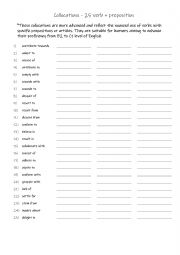
|
25 verb + preposition collocation.
These collocations are more advanced and reflect the nuanced use of verbs with specific prepositions or articles. They are suitable for learners aiming to enhance their proficiency from B2 to C1 level of English. Possible answers on page 2.
Level: advanced
Age: 12-100
Type:
Downloads: 131
|
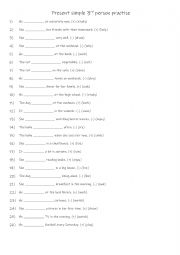
|
A1-A2 simple 3rd person practise
Students complete the sentences with the given verb. (+) means the verb is positive and (-) means the verb is negative. There are 13 positive and 13 negative sentences.Answers on page 2.
Level: elementary
Age: 8-100
Type: worksheet
Downloads: 131
|
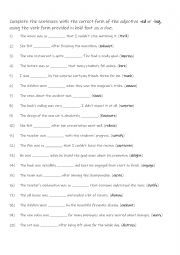
|
Make an adjective from the verb + Adj ending in : -ed or -ing practise
Students complete the sentences with the correct form of the adjective -ed or -ing, using the verb form provided in bold font as a clue.Answers on page 2.
Level: intermediate
Age: 9-100
Type:
Downloads: 131
|
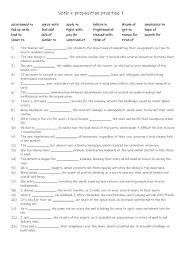
|
B1-B2 Verb + preposition practise Part 2
Many verbs in English are commonly used with specific prepositions, forming phrases that convey distinct meanings. Mastering these combinations helps students sound more natural and fluent. Knowing how to pair verbs with the correct prepositions improves their comprehension of conversations, texts, and media, allowing them to grasp nuanced meanings...
Level: intermediate
Age: 9-100
Type:
Downloads: 131
|
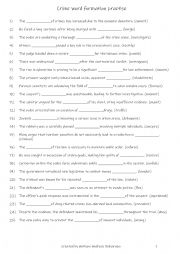
|
B1-B2 Crime word formation practise
Understanding word formation allows students to expand their vocabulary, enabling them to express themselves more precisely and creatively. Knowing how to manipulate words helps them create varied sentence structures, making their writing more engaging and dynamic. Mastering word formation is key to achieving higher levels of language proficiency, ...
Level: intermediate
Age: 8-100
Type:
Downloads: 131
|
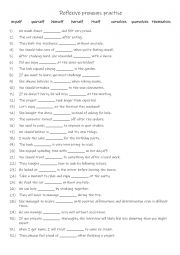
|
A2-B1 Reflexive pronouns practise
Learning reflexive pronouns is essential for effective communication and grammar accuracy, as they indicate when the subject and object of a sentence are the same (e.g., "I made myself a sandwich"). They also provide emphasis (e.g., "She did it herself") and enhance the complexity of sentences (e.g., "We enjoyed ourselves at the party"). Mastering ...
Level: elementary
Age: 8-100
Type:
Downloads: 131
|
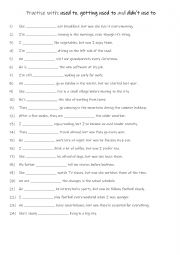
|
A2+-B1 Practise with used to, getting used to and didn�t use to
Students should learn used to, getting used to, and didn�t use to because these expressions are essential for describing past habits, changes, and adaptations. Used to highlights actions or states that were regular in the past but no longer occur, while getting used to focuses on the process of adjusting to new situations. Additionally, didn�t ...
Level: intermediate
Age: 9-100
Type:
Downloads: 131
|
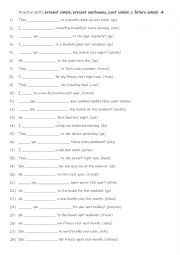
|
A1+-A2 Practise with present simple, present continuous, past simple & future simple 4
Students should learn and practice the present simple, present continuous, future simple, and past simple tenses at the A1+-A2 level because these tenses are essential for everyday communication, such as discussing routines, ongoing activities, past events, and simple future plans. They provide a solid foundation for learning more advanced grammar ...
Level: elementary
Age: 8-100
Type:
Downloads: 131
|

|
A2+-B1 Practise with 12 conditional phrases 4
First, students need to familiarise themselves with the 12 conditional phrases and their meanings and use. Then they read the sentences to see which one is suitable to complete the gap-fill. Each conditional phrase is used 2 times! Answers on page 2.
Level: elementary
Age: 9-100
Type:
Downloads: 131
|
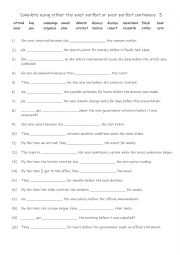
|
Complete using either the past perfect or past perfect continuous 3
First, students need to familiarise themselves with the 2 tenses and their use. Then they read the sentences to see which tense is needed to complete the sentence. Each tense is used 10 times! Answers on page 2.
Level: elementary
Age: 9-100
Type:
Downloads: 131
|












